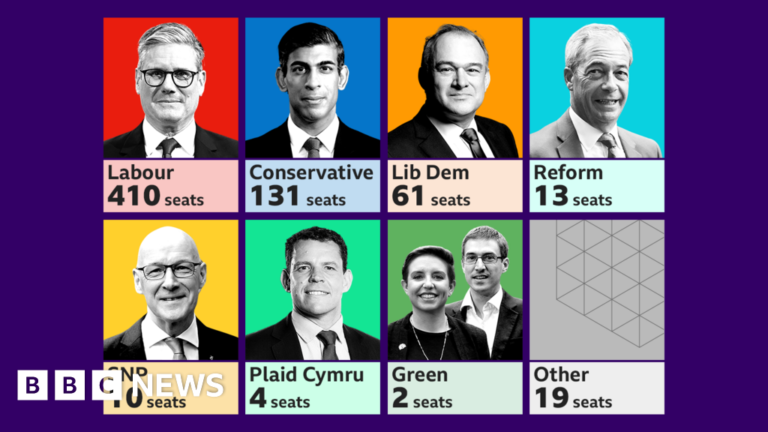- author, Brian Wheeler
- role, Political reporter
-
According to exit polls from the BBC, ITV and Sky, Labour is on track to win a landslide victory in the general election with a majority of 170 votes.
If the predictions are correct, Sir Keir Starmer will become prime minister with 410 Labour MPs – just below Tony Blair’s total in 1997.
The Conservative Party’s number of MPs is expected to fall to 131, the lowest in its history.
The Liberal Democrats are expected to come in third with 61 members.
Exit polls predict the SNP’s numbers will fall to 10 MPs, while Reform UK is expected to win 13.
The Green Party in England and Wales is expected to double its number of MPs to two, Plaid Cymru is expected to win four MPs, and the other parties are predicted to win 19 seats.
The exit poll, overseen by Sir John Curtice and a team of statisticians, was based on data from voters at around 130 polling stations in England, Scotland and Wales – it did not cover Northern Ireland.
In the past five general elections, the accuracy of exit polls has ranged from 1.5 seats to 7.5 seats.
If the exit polls are correct, it would be a remarkable turnaround for the Labour Party, which suffered its worst election result since the war in 2019.
While the Conservative Party may avoid the catastrophe predicted by some opinion polls, the likely outcome would be a devastating blow to the party after 14 years in power.
The Conservative defeat was likely brought about by the Liberal Democrats and Nigel Farage’s Reform UK, who look set to win more seats than many opinion polls had predicted.
We will have to wait until early morning, when most of the vote counting begins, to know whether the exit polls are accurate.
Former Scottish First Minister Nicola Sturgeon said it had “not been a good night” for the Scottish National Party (SNP), which is predicted to lose 38 seats, and said she believed that prediction was “broadly correct”.
Sir John Curtice said Labour’s projected landslide victory would be just short of the 179-seat majority won by Tony Blair in 1997 and could be achieved with a smaller share of the vote than former leader Jeremy Corbyn won in 2017.
But it will be seen as a vindication of Sir Keir Starmer’s efforts to transform the party and return it to the centre of British politics.
Labour’s deputy leader Angela Rayner told the BBC that Sir Keir had done a “fantastic job” of reforming the party, but added: “Exit polls are opinion polls so the results are not yet in.”
Liberal Democrat leader Sir Ed Davey said: “This is shaping up to be our best outcome in a generation.”
The Conservative Party is heading for its worst election since 1906, when it won 156 seats.
Rishi Sunak had maintained he could win until the end, despite Labour failing to relinquish a commanding polling lead during the six-week campaign.
“This is an incredibly difficult time for the Conservative party,” Conservative Work and Pensions Secretary Mel Stride told BBC Radio 4.
“It’s very disappointing” that exit polls predict some of his colleagues will lose their seats, he said. As for whether he will keep his own seat, he said, “We’ll have to wait and see.”
On Wednesday, the day before the election, Stride made headlines when he admitted he thought Labour was likely to win a majority, effectively conceding defeat.

